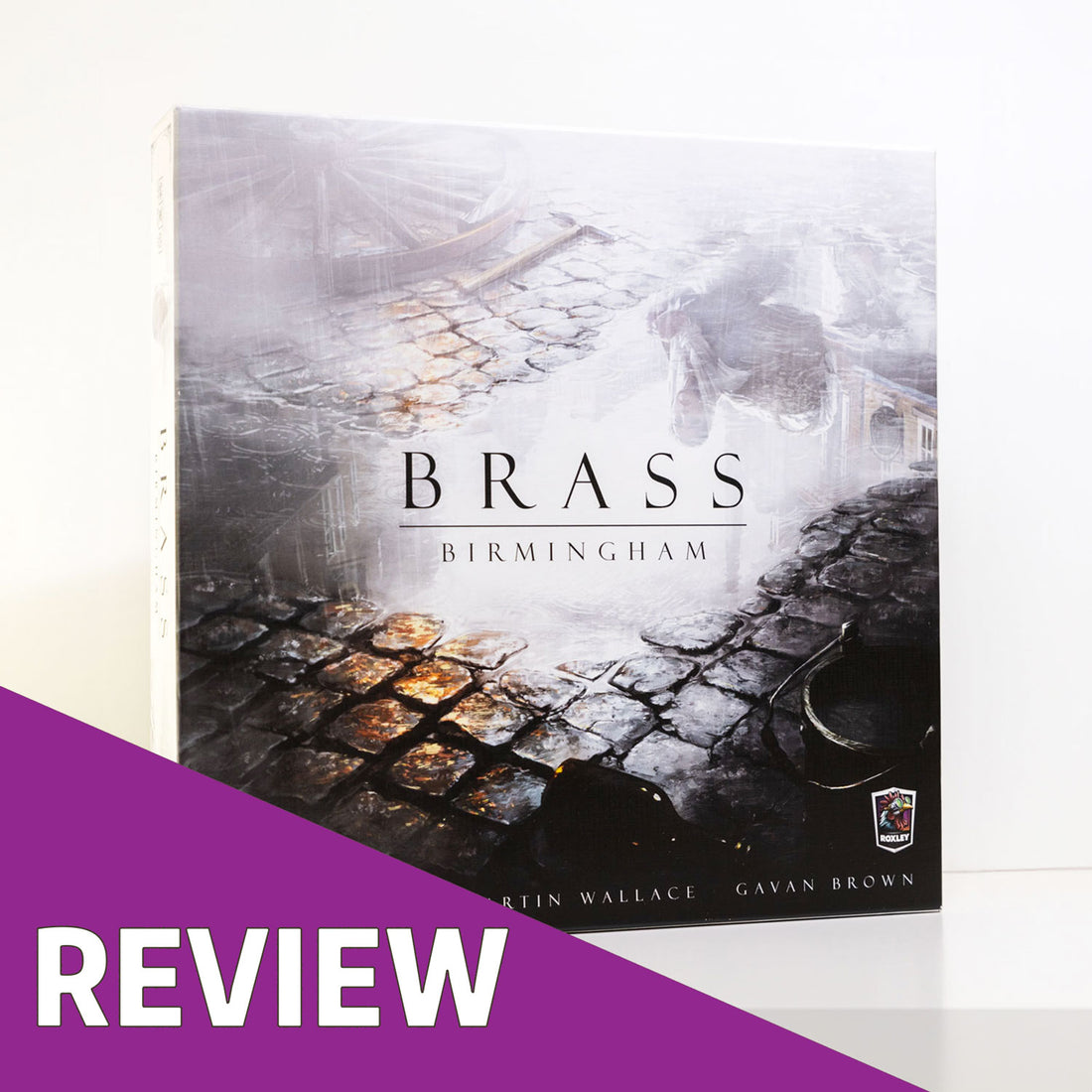Players: 2-4
Ages: 14+
Official Playtime: 60-120 minutes (which is pretty accurate)
Released: 2018
Publisher: Roxley Games
Reviewed by Edward.
Disclosure and foreword
1. I own a copy of "Brass: Birmingham," which I bought myself. At the time of publishing this review, I don't have any affiliations with the game's creators or publishers. The opinions in this review are my own. Find the Review Policy here.
2. I try to be as objective as possible, but at the end, the review contains my opinions that you might disagree with. If you do, let us know in the comments below.
3. My Experience With Brass: Birmingham: I have played the game in multiple sittings— as three and four players. Therefore, the review does not account for two-player games. That being said, mechanics-wise, two player games are almost identical to three and four player games.
4. The review does not teach how to play the game. This review does not fully detail all mechanics or teach how to play the game. It rather looks at the most important aspects, elements, and mechanics, providing an overall idea of the game's value so you can evaluate whether the game might be a good fit for you.

Let's Find Out How Good And Fun The "Brass: Birmingham" is!
Brass: Birmingham from Roxley Games has received multiple game awards and is in the number-one spot in the BGG ranking. So, yes, at least "a few" people like this game! But is it for you? Let's find out!
In this economics, resource management Eurogame, you'll expand your business empire in the late 18th and 19th centuries (in the canal era and railroad eras, respectively) while operating with the coal, iron, beer supply.
Your goal is to build the most industries and core the most points at the game's end!
Sounds simple? Well, not really. The game has many nuances and mechanics, making it fairly complex. The good news is that after starting to play, the rules become second nature, and from there - all steam ahead!
"Brass: Birmingham," Explained to a 10-Year-Old
Brass: Birmingham might be a bit too complex for most 10-year old's, but that being said:
In Brass: Birmingham, you become one of the industrial era's business barons and must expand your business empire by taking loans, building factories, and connecting routes between them.

Skill Level - How Difficult Was it to Learn Brass: Birmingham?
Difficulty Rating: 3.5/5
- The game has many specific rules, some of which change depending on the era (canal or railroad era).
- I watched the official how-to-play on their webpage and read the rulebook, but it still resulted in some overlooked rules when playing it for the first time.
- Despite nuanced rules, only a few of them are used rarely within the game, so you get used to these specific rules pretty quickly.
- The average board game player could learn the game from scratch after playing 1-2 times.
- The good news is that many unofficial tutorial videos that explain the commonly missed rules.
- Overall, the game has many nuances, making it difficult to learn but not difficult to play. So, I give it a complexity rating of 3.5/5 (higher means it is more complex).
Related: Methods for Learning Complicated Board Games.
Social Interactivity of Brass Birmingham
Social Rating: 3/5
In Brass: Birmingham, no rules require directly interacting with each other. That being said, each player has their player mats, but the action happens on the joint playing board. Most cities allow building several factories, while each road can be built by only one player, making the players compete for the available spaces on the board.
So, at the very least, you'll need to keep an eye out for what other players are doing on the board to strategize your next moves, making it an averagely social game. Which can be a good or bad thing, depending on how you look at it.
Best Number of Players
Brass: Birmingham is best played with 4 Players.
As mentioned, I have yet to play the game with one opponent, but given its mechanics, the two-player mode should play similarly to three- or four-player games, just with more freedom of choice and simpler strategy.
As with most Eurogame-type board games, more players usually result in more competition, an increased need for strategy, and more fun overall.
Yes, the game has a slightly different setup for 2, 3, or 4-player games, but still, 4-player games provide a more balanced and enjoyable experience with the one obvious exception—downtime. In 4-player games, you'll have to wait until your turn, sometimes even 5, 10 or more minutes.
That being said, three or two-player games are fun, but if you have the privilege of choosing between two--, three-, or four-player games, four-player games would be the best choice for most people.

What Did I Enjoy the Most About Brass: Birmingham?
Clever Mechanics, Like:
- Player board, industry tiles, and industry levels.
- Clever resource generation and consumption requirements.
- Variety of possible actions aligning with the theme.
- Two eras (the Canal era and the Railroad era) adding some key gameplay differences.
Simple Use of Cards
In Brass: Birmingham, players use their cards per every action, but the cards themselves are surprisingly simple. Basically, there are two types of cards, and that's it! This means that after learning the core mechanism of the cards, you don't need to read complex abilities or effects on the cards.
Language Friendly
Of course, at least one of your group will need to know the appropriate language to learn the rules, but after that - everything, except the city names, is described by symbols.
So, after learning the core rules, you can easily play it without knowing the game's printed language.
Art style
Art is obviously subjective, but objectively, Brass: Birmingham aligns the art style with its theme of the late 1700s to late 1800s industrial era. The art is consistent all across the board, which is a plus!
For more about the art, see the "Art and Design" section.
Complete Package
Brass: Birmingham is one of the rare modern board games that don't have expansions. For some, it might be a bad thing, but given its gameplay and thought-out mechanics, you can consider it a complete game out of the box, which is a nice refreshment compared to other games.
The standard edition box comes with quality materials, tokens, and cards. It also includes plenty of plastic bags to organize them. Sure, it could have included some board game mini-figures, but the components are good quality for its price.
To recap, key highlights of Brass: Birmingham
- Thematic gameplay;
- Clever use of resources and their management;
- Art style;
- Language friendly;
- Highly strategic;
- Two eras;
- Quality materials.
What Could Be Better?
Overall, it is an excellent game, but nothing is perfect, including Brass: Birmingham. So, let's find out some areas for improvement:
Rulebook
Overall, the rulebook is okay, but I would have liked some rules to be laid out in a separate section. Some rules were easy to overlook (e.g., the use of coal when building railroads or canal connection nuances), and some needed additional explanation (e.g., overbuilding and market consumption).
Hectic Pace
This is a bit subjective, but the game provides many options that often result in analysis paralysis. While some actions (like taking a loan) are super straightforward and take about 10 seconds to do, other actions, like building, require several steps to figure out what and where you can build (you need to match the right industry with the appropriate city, then plan its connections, check if you have enough materials, then re-check if you really have the right card to build the necessary industry), and that takes time.
Also, the turn order changes depending on money spent, so it is possible to begin one round but then have the last turn in the next round. In a 4-player game, that results in a 7-turn gap between your turns.
So, expect the pace of the game to be somewhat hectic - sometimes you'll wait 30 seconds until it is your turn, while sometimes it can take even 10+ minutes, especially in 4-player games.

Replayability of Brass: Birmingham
Rating: 4/5
Brass: Birmingham offers plenty of choices - 6 possible actions, 5 different industries to build, exploring many cities on the board, and countless variations of connection tiles to connect your industries.
These choices and options allow for many strategies, and at least for the first 10 games, you can utilize different play styles to keep it fresh.
Also, the game introduces some randomness with the marketplaces that are placed randomly for each game, but to be fair, it offers only a slight difference.
And the lack of expansions means that you get what you get without the option of upgrading it later.
Overall, Brass: Birmingham receives a replayability rating of 4/5.
Components and Art of Brass: Birmingham
Components
The standard edition of Brass: Birmingham includes a two-sided playing board, 4 player mats, 72 playing cards (and 4 player cards), 48 wooden cube resource tokens, 15 wooden beer tokens, 8 wooden player tokens, and a ton of cut-out tokens (326 in total).
Also, you'll receive plenty of plastic zip-lock bags, allowing you to conveniently organize and store all of the elements straight out of the box.
Although the standard version does not include any fancy miniatures or metal tokens, it is a well-packed game. You can always choose to go for the Deluxe version, which has iron clay counters for a more premium feel.
Art and Design
The game is illustrated with the late 1700- and 1800-industrial era styling, meaning the illustrations all over the board are kept in dark, gray-ish tones with highly contrasting elements.
Personally, I think the art looks good. It is not the best in the industry compared to some other unrelated board games, but it is one of the best-illustrated industrial-era board games I know of. I completely understand if someone might dislike this style, but most importantly, the art works perfectly with the chosen theme, so in my opinion, the game is well illustrated.

Personal Take: Canal and Railroad Eras
A full playthrough of Brass: Birmingham involves two eras—the canal era and the railroad era—each with its specific rules. In my opinion, this is a great mechanic that makes the game more dynamic and prevents one player from dominating early on.
That being said, the railroad era is more challenging—I mean that in the best sense. I would have liked to rebalance the game so that more turns were made in the Railroad era. In every game I played, there were just two or three actions I needed to complete my master plan!
Of course, the rules are exactly the same for every player, but in my playgroup, basically, all were in favor of the railroad era and wished the emphasis was more on this era.
Value For Money
Rating: 4.5/5
The game includes good quality wooden tokens, playing cards, and a ton of cut-outs; it is well illustrated, so component-wise, it has it all. And the gameplay is excellent! But how good of a value is it for the price?
Brass: Birmingham is a popular game sold worldwide in many e-stores and retail stores, so its price varies. As it is with most things, given the price you can get it for, its value changes accordingly.
I got a decent deal and purchased a new copy for just shy of 70 USD (including shipping), which is about the lowest I have seen. This would make it a great value game. The retail price is 80 USD (without shipping), which still makes it a good value.
That all being said, considering the beautiful art style, polished mechanics, and good quality tokens, it is a great value.
Not convinced? Find out some of best Brass: Birmingham alternatives here.

Final Rating and To Who Would I Recommend Brass: Birmingham?
Final Rating: 5/5
I like challenging, strategic gameplay without minding a few tricky rules, so, yes, I would recommend this game to me! But is it for you? Let's find out!
Most likely, it is not for you if:
- You strictly enjoy laid-back games with straightforward rules;
- You dislike competitive games;
- You enjoy only fast-paced games;
- You don't like to look for things on the board;
- You just hate the gray-ish style of the industrial era;
- Expansions are a must for you.
Otherwise, it is an excellent choice for players:
- Who are willing to dive deep into the mechanics and nuances of rules;
- Who likes to plan 3-5 steps ahead;
- Who enjoy a mental challenge;
- Who wants Ticket to Ride but with MORE of everything.
Overall, I am giving it a perfect 5/5 because it is a fantastic game with robust mechanics, good replayability value, a thematic art style, and good-quality components. Yes, a few aspects might be improved, but those are smaller details. In all areas where it counts, Brass: Birmingham is a fantastic board game.
In the meantime, feel free to explore what Joyful Games has to offer - from Brass: Birmingham alternatives, other board game reviews and board game tips to fun board and card games.
---
Want a more straightforward card game to play with your friends?
The Spheres of Life: Mythical Forest is a competitive fantasy card game for 2-7 Players. Learn to play within 20 minutes, set up in 5 minutes, and play in 20-30 minutes!


